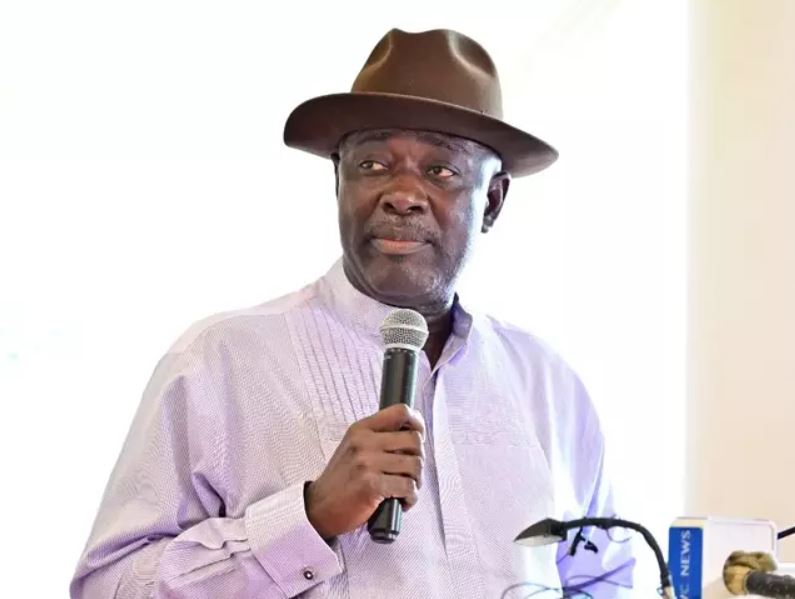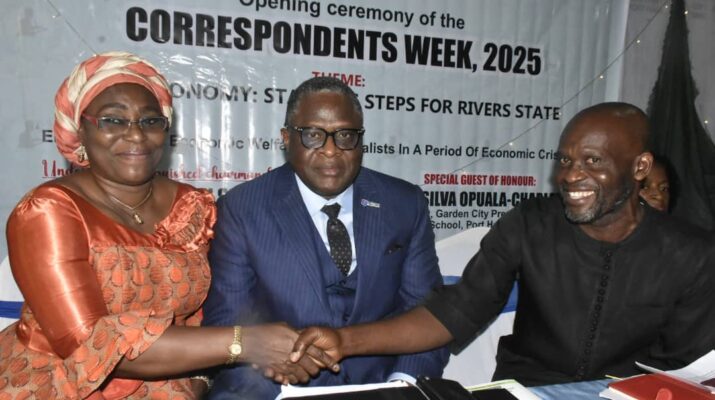Professor Opuala-Charles insists that to effectively clean up the 13 million barrels of oil spills in Ogoniland and the entire Niger Delta region, a whopping $12 billion is required
By Jude Nzennaya, Port Harcourt
For the decades of ecological devastation caused by oil exploration activities of multinational in the Niger Delta region, stakeholders will have to spend a whopping $12 billion to clean up the over 13 million barrels of spills vomited on the oil producing areas for over 67 years since 1958.
President of the Garden City Premier Business School and Special Guest of Honour, Prof. Silva Opuala-Charles, made the assertion at the 2025 Correspondents’ Chapel Week of the Nigeria Union of Journalists (NUJ), stressing that strategy without structure is useless.
Insisting that Nigeria has been largely unprepared to harness the full potential of the country’s blue economy, Opuala-Charles, who declared the week open, said Rivers State with about 112 Km coastline, deserves better attention, stressing that harnessing the blue economy would only be sustained if proper fiscal federalism is put in place.
He said if the economy grows it must translate to high per capita income of the citizens, but lamented that the entire seas in the Niger Delta have been polluted to the extent that there are no more fishes in them due to oil exploration and exploitation. He described pollution as poison to the growth of blue economy.
He said the United Nations (UN) has clearly stated that Nigeria needs about $12bn to clean up the Niger Delta region, which he said had witnessed 13m barrel of oil spills since 1958, adding that Nigeria’s blue economy is worth over $24 trillion and about $115 trillion globally, pointing out that the blue economy comprises maritime, fisheries, aqua-culture and tourism, among others.
While stating that there is the need to revive the old city states, such as Bonny, Nembe, Buguma, among others before talking about realisation of the blue economy, he commended the Correspondents Chapel of NUJ for choosing the theme: Blue Economy: Starting Steps for Rivers State, noting that it is possible to achieve the endowment of the blue economy with commitment and seriousness.
Speaking, Chairman of the occasion, Dr. Chamberlain Peterside, who was represented by Atonye Wilcox, said there is more business in blue economy than the oil and gas industry, noting that it is a matter of harnessing it while suggested that the old Port Harcourt Township could be developed and linked to the seas, which he said constitute the blue economy.
He pointed out that if these areas are well developed and restored, the economy will naturally boom and cautioned that environmental issues must be tackled before thinking of investment, stressing that the economy cannot be addressed in isolation without the environment.
“All of these cannot be tackled without journalism, which is information dissemination. NUJ has therefore done noble by beaming satellite on blue economy,” he said.

In his keynote address, Dean School of Eloquence and Founder Blue Economy Academy, Ubong Essien, who described Nigeria as a “sea of blind nation, lamented that despite the fact that it has over 853km of coastline, vast inland waterways, rich biodiversity and bustling port cities, the country behaves like landlocked nation.
He said it was more worrisome that despite multiple economic shocks, occasioned by crashing oil prices, declining crude imports and rising youth unemployment, Nigeria continues to overlook the ocean.
He cited sharp drop of United States (U.S.) crude oil import from Nigeria from one million barrels per day to five thousand, which he said would have acted as a wakeup call for Nigeria to diversify her economy, but that was not to be.
“The truth is Nigeria’s obsession with oil has blinded us to an even greater wealth, the blue economy,” Essien said, and queried the why Rivers State has not used its advantaged position as a coastal state to develop the state’s blue economy. Rivers State should be Nigeria’s blue economy headquarters–home to ports, pipelines, mangroves, marine tech, fisheries and floating opportunities,” he stressed.
Essien emphasized that without journalists, who he described as “rescuers of national awareness,” much cannot be achieved in harnessing the blue economy.
In her goodwill message, the Chairperson of National Association of Women Journalists (NAWOJ), Rivers State Chapter, Comrade Susan Serekananwikana, commended the Correspondents’ Chapel for sustaining its week for years now, urging other chapels to borrow a leaf from them. She attributed the Correspondents’ Chapel’s success to the prowess of the Organising Committee Chairman, Ignatius Chukwu and the Chapel’s leadership, urging him to extend the Midas touch to the state Council of NUJ.
Chairman Organising Committee of the 2025 Correspondents’ Chapel Week, Ignatius Chukwu, who gave the vote of thanks, commended the guests for honouring their invitation and the committee members for a job well done. He urged journalists to turn their talents into products and sell them.
Chukwu also urged the NUJ to take advantage of its position to harness her potentials. He equally thanked the Correspondents’ Chapel leadership for the confidence reposed in him and other committee members.




